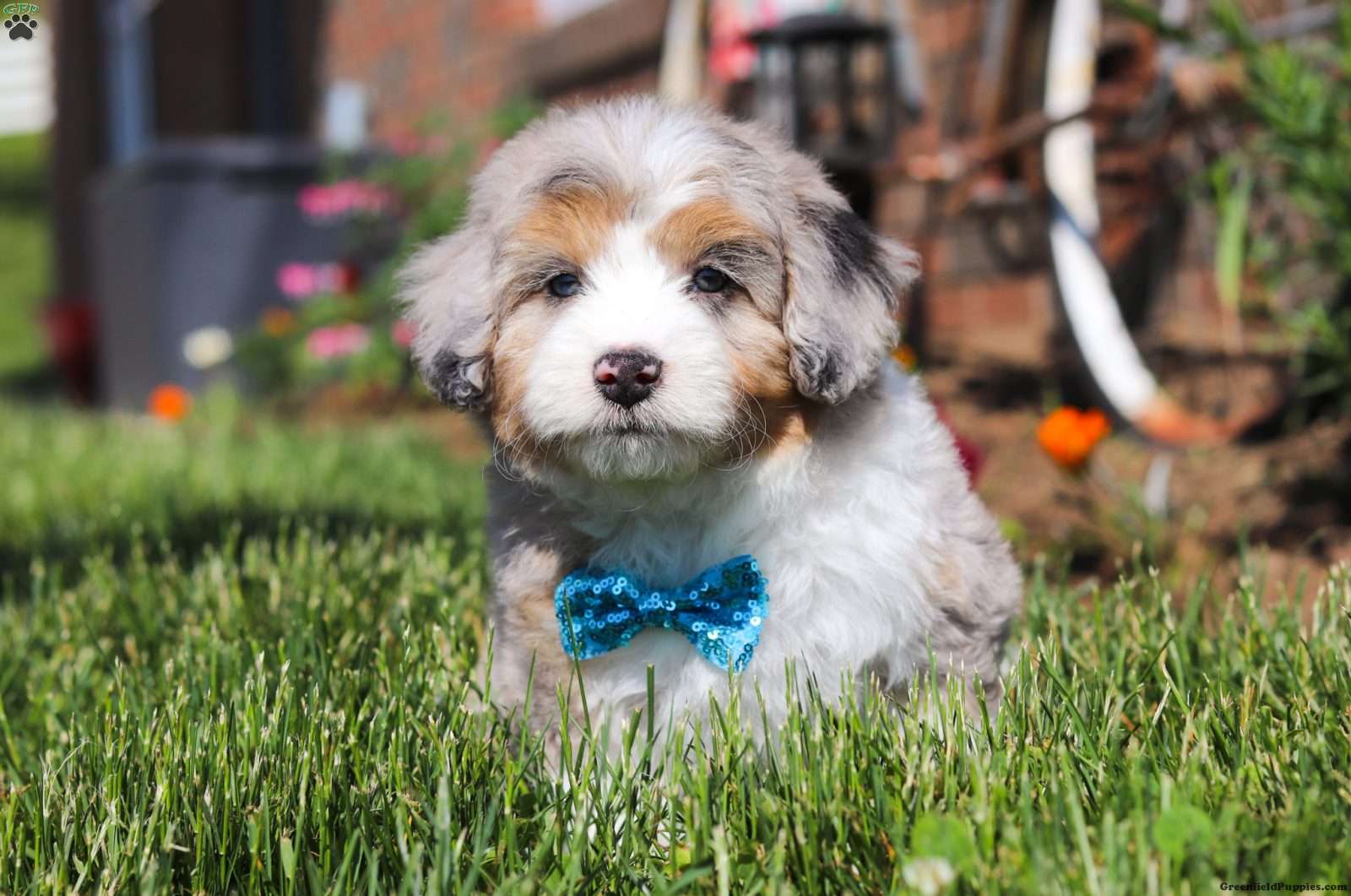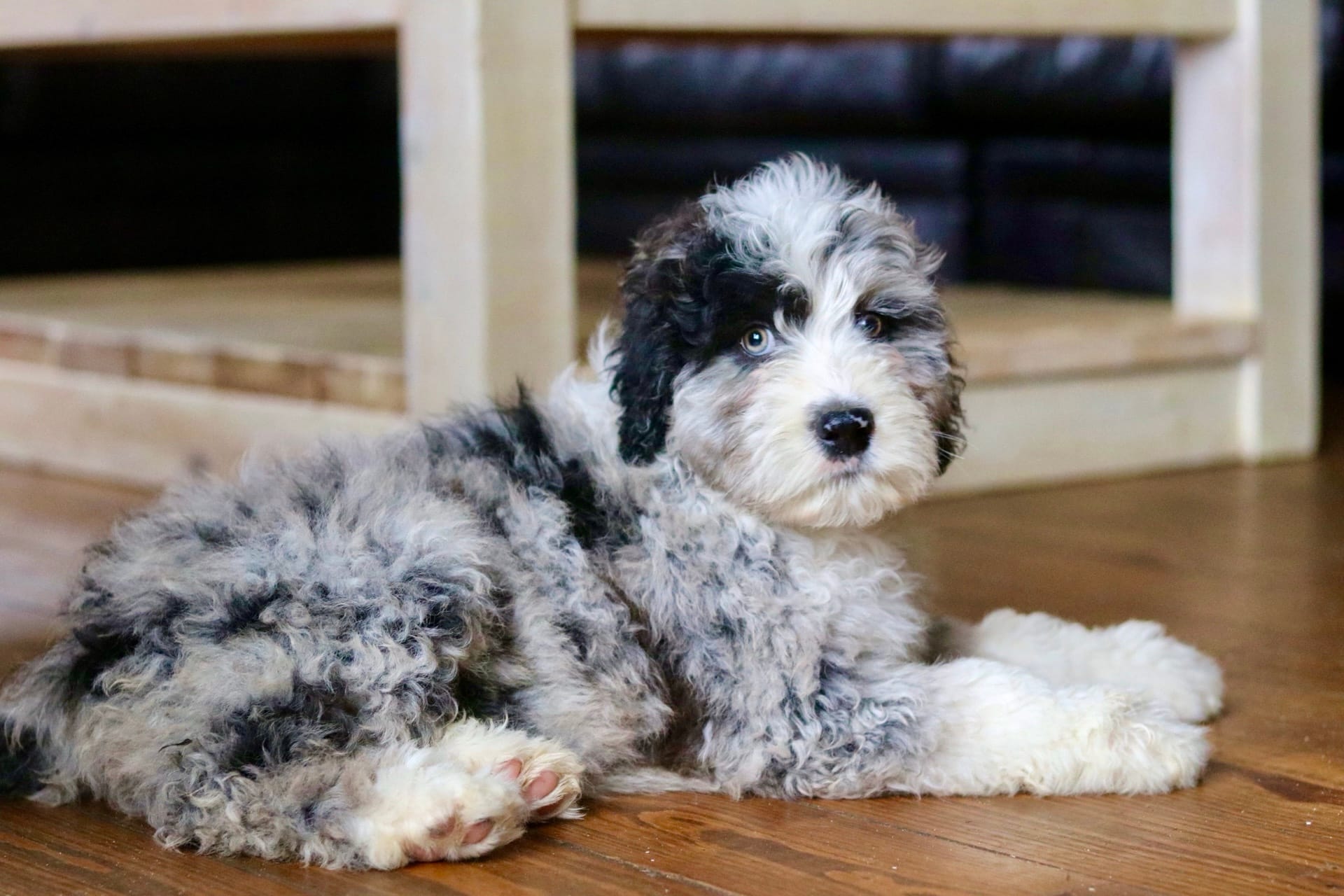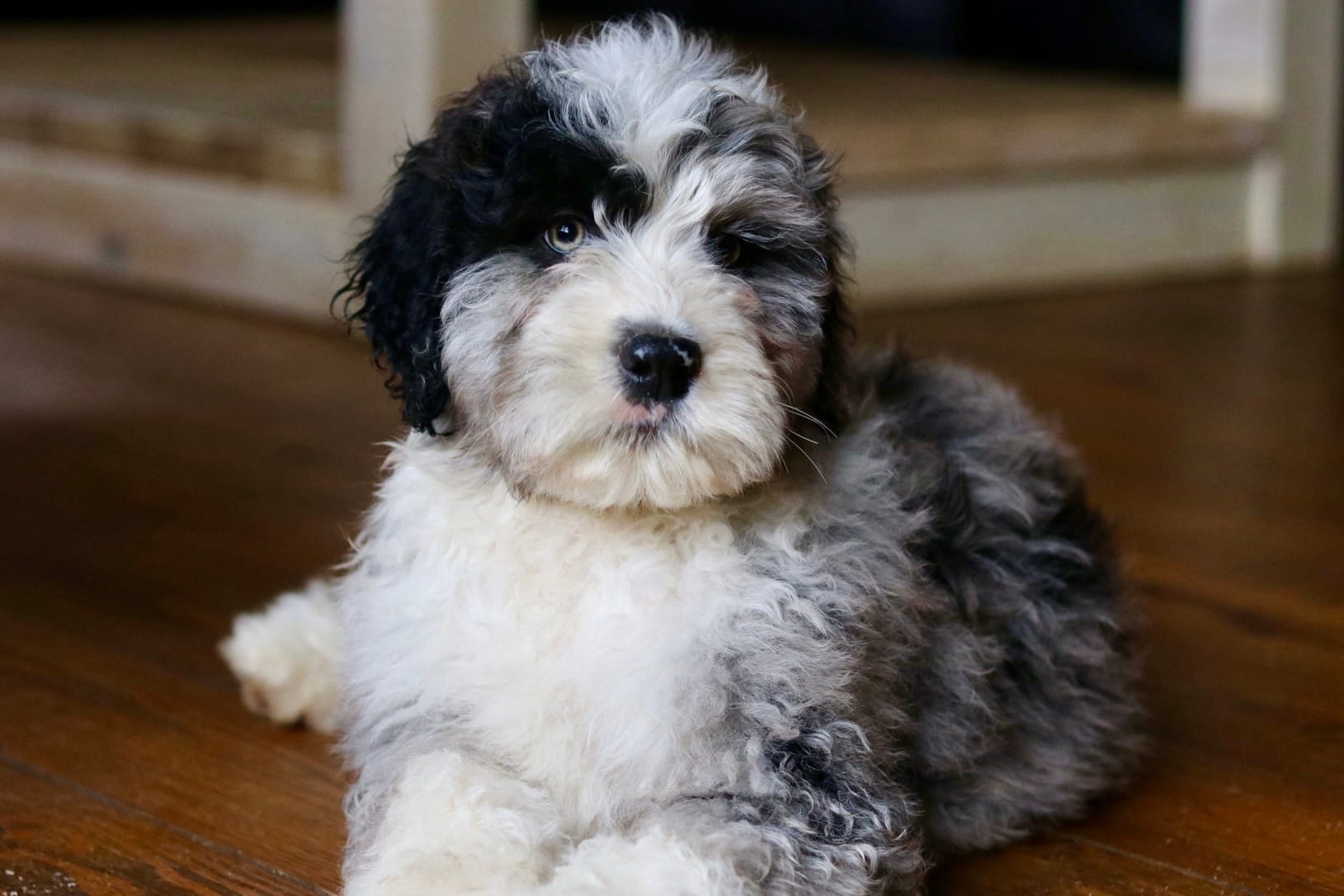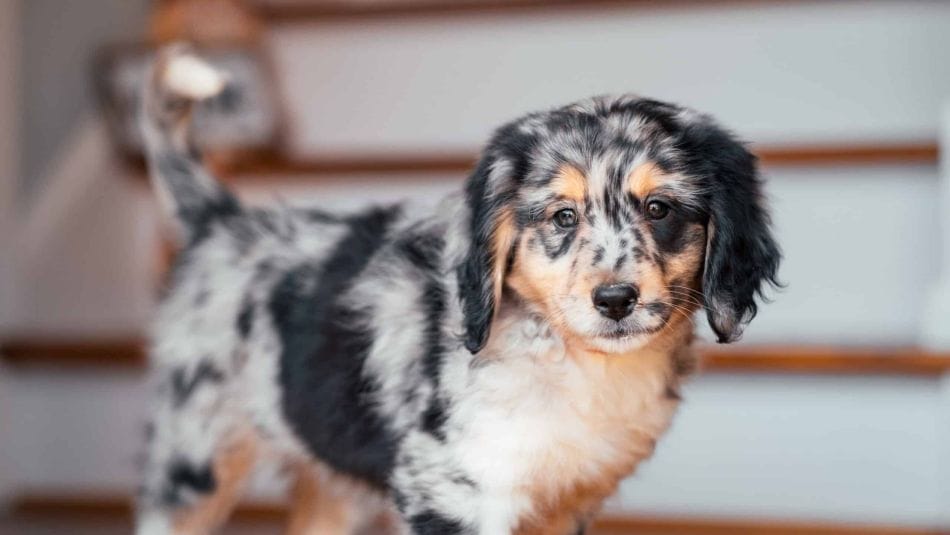Aussiedoodle puppies represent a delightful blend of the intelligent and agile Australian Shepherd and the hypoallergenic and loving Poodle. As a designer hybrid, they inherit the best traits of both parent breeds, making them increasingly popular among dog enthusiasts seeking a clever, family-friendly pet. They often display the Australian Shepherd's drive and the Poodle's eagerness to please, culminating in a trainable and affectionate companion.

Characterized by their fluffy coat and expressive eyes, these puppies come in a variety of colors and patterns. Their coats can range from wavy to curly, reflecting their Poodle heritage, and typically require regular grooming to maintain a healthy and mat-free appearance. Potential owners should be aware of the commitment that comes with caring for such an active and high-maintenance breed.
Aussiedoodle puppies thrive in environments where they can channel their energy and intelligence into various activities. They excel in dog sports like agility and obedience, and also enjoy interactive play that stimulates their minds. With a lifespan of 10 to 12 years on average, adopting an Aussiedoodle puppy is a long-term commitment to nurturing a loyal and spirited family member.

Understanding Aussiedoodles
Aussiedoodles combine the best of two highly intelligent breeds, the Australian Shepherd and Poodle, into a mixed breed dog known for its intelligence and affectionate nature.
Breed Origins
The Aussiedoodle is a relatively new mixed breed, emerging from the desire to create a dog that exhibits the intelligence and the low-shedding coat of the Poodle with the energetic and friendly disposition of the Australian Shepherd.
Parent Breeds:
- Australian Shepherd: Originally bred to herd livestock, they are known for their intelligence, agility, and obedience.
- Poodle: They rank among the most intelligent breeds, excelling in obedience training and are known for their hypoallergenic coats.
Characteristics
Aussiedoodles exhibit a variety of physical traits, often inherited in a unique combination from their Australian Shepherd and Poodle ancestors.
| Trait | Description |
|---|---|
| Size | Medium to large, depending on Poodle parent |
| Coat | Soft, wavy to curly, low to no shedding |
| Color | Varies (e.g., black, white, brown, merle) |
| Lifespan | Typically 10-12 years |
Grooming Needs: Regular brushing is necessary to prevent matting and maintain their coat's health, while the frequency of baths depends on the dog's lifestyle and environment.
Temperament
Aussiedoodles are known for their loving and gentle disposition. They thrive on human companionship and often get along well with children and other pets.
- Intelligence: With both parent breeds being among the more intelligent breeds, Aussiedoodles are quick learners and excel in obedience and agility training.
- Activity Level: High energy, requiring regular exercise to keep them physically and mentally stimulated.
- Socialization: Early socialization is important for them to develop a well-rounded character.

Health and Care
In overseeing the health and care of Aussiedoodle puppies, it is paramount to address their potential health issues, maintain proper grooming, and ensure a balanced diet.
Common Health Issues
Aussiedoodles may inherit health problems prevalent in their parent breeds. They can be prone to hip dysplasia, a condition where the hip joint doesn't fit properly, leading to arthritis. Monitoring for epilepsy, which causes seizures, and hypothyroidism, affecting the thyroid gland, is also crucial for Aussiedoodle owners. Prospective owners should seek puppies from reputable breeders who test for these conditions.
- Health Issues to Monitor:
- Hip Dysplasia
- Epilepsy
- Hypothyroidism
Grooming Needs
The Aussiedoodle's coat, often praised for being hypoallergenic and low-shedding, nonetheless requires regular grooming. They should be brushed several times a week to prevent tangles and mats and bathed when necessary. Regular ear checks and teeth cleanings are also recommended to avoid infections and dental issues.
- Grooming Checklist:
- Brushing multiple times per week
- Occasional baths
- Ear and dental care
Diet and Nutrition
A balanced diet is vital for an Aussiedoodle's health, supporting growth and energy needs. Puppies require high-quality puppy food that caters to their nutritional requirements. Some Aussiedoodles may develop allergies, so it's essential to observe for any adverse reactions to their diet and consult with veterinarians to tailor a feeding plan.
- Nutritional Focus:
- High-quality puppy food
- Tailored to individual dietary needs
- Monitoring for food allergies
Secure and Enhance Your Aussiedoodle's Adventures with the Fi Dog Collar
As you embrace the journey of welcoming an Aussiedoodle into your life, their safety and well-being are paramount. The Fi Dog Collar is a perfect companion for your Aussiedoodle, a breed known for its intelligence, energy, and playfulness.
This state-of-the-art collar comes equipped with advanced geofence technology, allowing you to create safe zones and immediately alerting you if your adventurous pet strays beyond these boundaries. This feature is particularly beneficial for Aussiedoodles, who may inherit the Australian Shepherd's herding instincts and the Poodle's curiosity, leading them to explore beyond familiar grounds.
In addition to its safety features, the Fi Dog Collar also tracks your pet's activity levels, ensuring they're getting the exercise they need to thrive, aligning perfectly with the Aussiedoodle's high-energy nature. By incorporating the Fi Dog Collar into your routine, you not only prioritize the safety of your Aussiedoodle but also contribute positively to their overall health and happiness.
As we delve into the characteristics and needs of the Aussiedoodle in this article, the Fi Dog Collar stands out as an essential tool for enhancing your journey with this delightful and energetic companion.
Training Your Aussiedoodle
Training an Aussiedoodle can be a fulfilling experience due to their intelligence and high trainability. This breed is energetic and smart, demanding consistent and varied training approaches.
Basic Obedience
For Aussiedoodles, basic obedience training should start as soon as they're brought home. It sets the groundwork for a well-behaved pet and prevents future behavioral problems. Begin with commands such as sit, stay, come, and down. Due to their smart nature, Aussiedoodles often learn these commands quickly.
- Commands to Start With:
- Sit
- Stay
- Come
- Down
Training sessions should be short, around 15 minutes, to maintain their attention. Incorporating play with obedience lessons helps to manage their high energy levels and keeps training enjoyable.
Advanced Training
After mastering basic obedience, Aussiedoodles can progress to more advanced training. Their high intelligence makes them suited for dog sports like rally or flyball. Training for these activities not only adds variety to their routine but also channels their energy positively.
- Dog Sports and Activities:
- Rally: Enhances obedience through a series of commanded actions.
- Flyball: Provides a high-energy outlet and teamwork focus.
Advanced training can also prepare Aussiedoodles to become therapy dogs. This path requires patience and consistent training to develop the necessary calm and obedient demeanor.
Behavioral Challenges
Despite their trainable nature, Aussiedoodles may exhibit behavioral challenges if not properly stimulated. Addressing issues early is critical to prevent them from becoming ingrained habits.
- Common Challenges:
- Excessive barking
- Destructive chewing
Daily physical activity and mental stimulation are essential. An Aussiedoodle's activity level is high; they require ample exercise and brain games to prevent boredom and associated behavioral issues. Regular training reinforces good behavior and provides the mental challenge they crave.

Exercise and Activity
Aussiedoodle puppies are known for their high energy levels and playful nature, requiring regular exercise and activity to maintain a healthy lifestyle.
Exercise Requirements
Aussiedoodles are an active breed that needs daily exercise to satisfy their energy. They often exhibit a natural agility that benefits from a combination of both physical and mental stimulation. On average, they require at least 60 minutes of exercise per day, which can be split into two or more play sessions. This can include walks, runs, and any activities that challenge their herding instincts and agility.
Outdoor Activities
Outdoor play is vital for Aussiedoodle puppies, as it allows them to burn off energy while exploring new environments. Activities in a fenced yard can include:
- Fetch: Engages their playful side and provides sprinting exercise.
- Agility Training: Builds coordination and strengthens their bond with their owner.
- Swimming: Allows for a low-impact exercise that excellent for their muscular development.
Outdoor activities not only fulfill their exercise needs but also contribute to their overall behavioral development by presenting diverse stimuli.
Indoor Play
For days when outdoor play is not possible, indoor activities can help keep them active. Consider the following:
- Tug-of-War: An interactive game that can positively impact their playtime and energy exertion.
- Hide and Seek: Stimulates mental exercise and satisfies their herding and agility needs.
- Puzzle Toys: Provide mental stimulation that is as crucial as physical exercise for this intelligent, active dog breed.
Regular indoor play sessions help in preventing boredom and mitigating excessive energy that could lead to unwanted behaviors.
Living with an Aussiedoodle
An Aussiedoodle can bring vibrant energy and companionship to any home. This section aims to detail the dynamics of incorporating an Aussiedoodle into family life, its socialization needs, and the ideal home environment.
Family Life
Aussiedoodles thrive in environments where they are considered a part of the family unit. They are known for their affectionate nature and form strong bonds with family members. These dogs are particularly good with children, often displaying a patient and playful demeanor. They adapt well to active families who are able to involve them in various activities, ensuring they are a central part of family routines.
Socialization
Early and continued socialization is crucial for an Aussiedoodle. Exposing them to different people, pets, and environments helps develop a well-rounded and safe pet. The breed is known for being friendly, but without proper socialization, they can become shy or nervous around strangers. Pet parents should regularly introduce their Aussiedoodle to new experiences in a positive and controlled manner.
The Right Home Environment
The ideal home for an Aussiedoodle is one where they will receive plenty of daily attention and mental stimulation. An Aussiedoodle's home should have:
- Safe, enclosed outdoor space: for play and exercise.
- Variety of toys: to keep them mentally engaged.
- Consistent schedule: for feeding, exercise, and training.
They require an environment that will cater to their high energy levels and intelligence. Without this, they may develop unwanted behaviors. A commitment to training and inclusion in household activities will help ensure that the Aussiedoodle develops into a well-mannered family dog.

Choosing an Aussiedoodle
When selecting an Aussiedoodle puppy, one must focus on finding reputable breeders and understanding key puppy considerations to make an informed decision.
Finding a Breeder
Prospective Aussiedoodle owners should prioritize breeders who adhere to ethical breeding practices. Researching breeders is crucial, and individuals can start by checking with the American Kennel Club (AKC) for breeders who follow their guidelines.
- Look for breeders who:
- Are recognized by the AKC
- Have a transparent breeding process
- Provide comprehensive health clearances for both puppy parents
- Allow visits to meet the puppies and see the living conditions
Avoiding puppy mills is non-negotiable. Puppies from these places may be cheaper, but they often come with hidden health and behavioral problems due to poor breeding practices and inadequate care.
Puppy Considerations
Before committing to a puppy, potential owners must consider certain factors to ensure they select a healthy and well-socialized Aussiedoodle.
- Key considerations include:
- Health: Check vaccination and health records.
- Temperament: Observe the puppy's behavior and look for one that is friendly and curious.
- Physical Examination: Examine the puppy for any signs of neglect or illness.
It's important to choose a puppy that appears energetic and responsive, with clear eyes and a clean coat. One should ask about the puppy's dietary habits and any initial training they have received to gauge the level of care provided by the breeder.
Aussiedoodle Varieties
The Aussiedoodle, a hybrid of the Poodle and Australian Shepherd, comes in various sizes and sports a coat with several possible textures and patterns. This section examines the size and appearance profiles of mini and standard Aussiedoodles alongside their distinct coat types.
Size and Appearance
Mini Aussiedoodles typically weigh between 10 to 25 pounds and stand at a height of 12 to 18 inches, marked by their agility and compact build. Standard Aussiedoodles, in contrast, can weigh anywhere from 40 to 70 pounds with a stature of 15 to 25 inches, depicting a solid physique. Both sizes inherit the Australian Shepherd's athletic appearance and the Poodle's elegant posture, forging a visually dynamic and sturdy designer breed.
Coat Types
Aussiedoodles may exhibit various coat types:
- Straight Coat: Rare, resembling more of an Australian Shepherd's fur.
- Wavy Coat: Commonly seen; a blend between the Poodle's curls and the Australian Shepherd's straighter coat.
- Curly Coat: Similar to a Poodle, often low-shedding and hypoallergenic.
In terms of texture, Labradoodle coats are often compared, being similarly low-shedding, but Aussiedoodles usually have a softer texture. Meanwhile, Goldendoodle coats are more variable, ranging from straight to curly. In all, Aussiedoodles may require regular grooming to manage tangles and mats due to their often thick and plush fur.
Ownership Responsibilities
Owning an Aussiedoodle puppy involves specific responsibilities to ensure their health, safety, and happiness. They require both time and financial commitment from the owner. Proper care includes routine medical attention, a safe environment, and sufficient emotional engagement.

Time and Commitment
Owners must dedicate several hours daily to their Aussiedoodle's needs, which include exercise, training, and companionship. Training is critical early on, as it establishes good behavior and social skills.
- Exercise: Daily walks and playtime to support their energetic nature
- Training: Consistent, positive reinforcement training sessions
- Socialization: Exposure to various people, pets, and environments
- Grooming: Regular brushing to prevent matting and trimming every 8-12 weeks
Financial Considerations
The financial aspect of Aussiedoodle ownership spans initial costs, regular care expenses, and unexpected healthcare. Owners should budget for:
- Initial Costs: Purchase price, initial vaccines, spay/neuter surgery, microchipping
- Routine Care: Food, grooming supplies, interactive dog toys, preventative medications
- Medical Expenses: Regular check-ups, emergency care, possible accidents
Estimated Annual Cost
| Item | Estimated Cost (USD) |
|---|---|
| Food | $250 - $700 |
| Routine Vet Visits | $200 - $600 |
| Vaccinations | $80 - $150 |
| Grooming | $30 - $80 per session |
| Preventative Medication | $100 - $300 |
| Emergency Funds | $200 - $1000+ |
Owners should also consider the potential for accidents or illnesses that require additional treatment or medication, impacting overall costs. Vaccines are essential to prevent diseases and should be accounted for in the annual budget.

Frequently Asked Questions
The following Frequently Asked Questions are designed to give insights into costs, sizes, living adaptations, grooming, compatibility, and temperaments of Aussiedoodle puppies.
- Q1: What factors affect the price of Aussiedoodle puppies?
- Prices of Aussiedoodle puppies vary based on factors like pedigree, coat colors, breeder reputation, and geographic location. Rarity and demand for specific traits can also influence the cost.
- Q2: What are the size differences between Mini, Toy, and Standard Aussiedoodles?
- Mini Aussiedoodles typically weigh between 15-35 pounds, Toy Aussiedoodles are smaller at under 15 pounds, and Standard Aussiedoodles can weigh 40-70 pounds. Size is determined by the poodle parent's size.
- Q3: How do Aussiedoodles adapt to indoor living environments?
- Aussiedoodles adapt well to indoor living as long as they receive adequate exercise. They are intelligent and can be trained to live comfortably in apartments and houses alike.
- Q4: What are the grooming requirements for Aussiedoodle puppies?
- Regular grooming is required for Aussiedoodles to maintain their fur and prevent matting. This includes brushing several times a week and professional grooming every 6-8 weeks.
- Q5: Are Aussiedoodles suitable for families with children or other pets?
- Aussiedoodles are typically friendly and do well in family settings with children and other pets. Early socialization is important for them to become well-adjusted companions.
- Q6: What are the typical characteristics and temperament of an Aussiedoodle?
- Aussiedoodles are known for their intelligence, playfulness, and affectionate nature. They are often eager to please, making them trainable, and are known for being loyal to their families.




